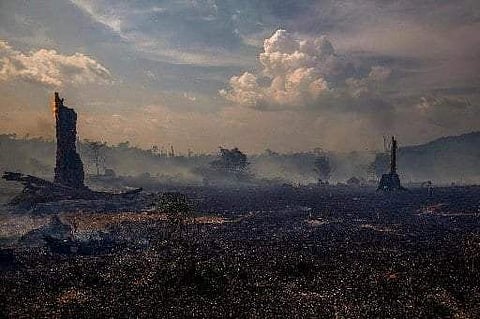

Large ecosystems, such as the Amazon rainforest, may collapse and disappear alarmingly quickly, once a critical point in their destruction is reached, according to a study that calls for improved conservation efforts to protect these habitats.
Researchers, including those from the University of London in the UK, revealed the speed at which ecosystems of different sizes will disappear, once they have reached a point beyond which they transform into an alternative habitat.
The study, published in the journal Nature Communications, noted that shifts in the Earth's ecosystems occur over human timescales of years and decades, meaning the collapse of large vulnerable ecosystems, such as the Amazon rainforest and Caribbean coral reefs, "may take only a few decades once triggered.
" According to the findings, once the "point of no return" is reached, the iconic Amazon rainforest could shift to a savannah-type ecosystem with a mix of trees and grass within 50 years.
Earlier studies had suggested that many ecosystems are currently teetering on the edge of this precipice, with the fires and destruction both in the Amazon and in Australia, the researchers said.
"Unfortunately, what our paper reveals is that humanity needs to prepare for changes far sooner than expected," said study co-author Simon Willcock from Bangor University in the UK.
"These rapid changes to the world's largest and most iconic ecosystems would impact the benefits which they provide us with, including everything from food and materials, to the oxygen and water we need for life," Willcock said.
The scientists explained that ecosystems which are made up of a number of interacting species, rather than those dominated by one single species, may be more stable and take longer to shift to alternative states.
These findings, according to the researchers, provide opportunities to mitigate or manage the worst effects.
Citing an example, they said, elephants are termed as 'key stone' species as they have a disproportionately large impact on the landscape -- pushing over trees, but also dispersing seeds over large distances.
The scientists noted that the loss of such key stone species may lead to a rapid and dramatic change in the landscape within our lifetime.
"This is yet another strong argument to avoid degrading our planet's ecosystems, and we need to do more to conserve biodiversity," said Gregory Cooper from the University of London.
"We intuitively knew that big systems would collapse more slowly than small ones -- due to the time it takes for impacts to diffuse across large distances," said John Dearing, study co-author from Southampton University in the UK.
However, Dearing said it was unexpected to find that big systems collapse much faster, "even the largest on the Earth only taking possibly a few decades.
